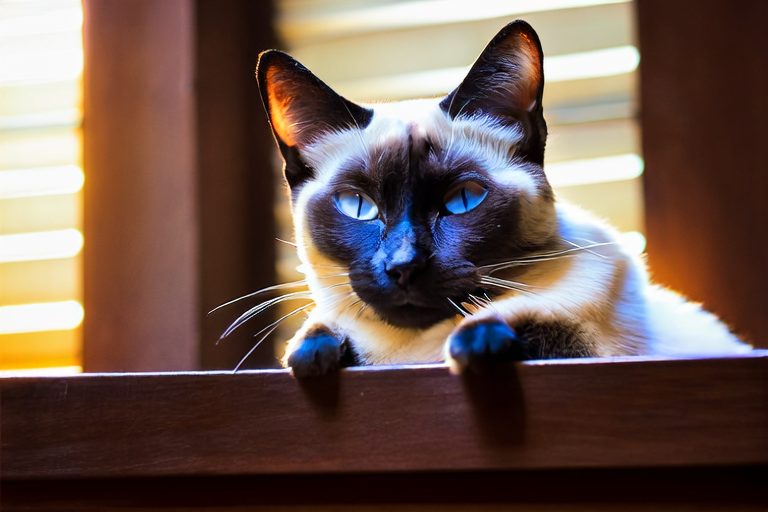Distinctive Personality Traits of Siamese Cats
The Siamese cat is one of the most recognizable and popular breeds in the world, known for its striking blue almond-shaped eyes, sleek coat, and distinct color points. But beyond their physical appearance, Siamese cats have a unique set of personality traits that make them stand out among other feline breeds. From their vocal nature to their high intelligence and social behavior, this article explores the distinctive characteristics of Siamese cats and offers insights into how owners can best interact with and care for these remarkable animals.
Vocal Nature
One of the most distinctive traits of Siamese cats is their vocal nature. They are known for being talkative and will often communicate with their owners through a range of meows, chirps, and trills. This vocalization is part of their bid for attention, as they are highly social animals that thrive on human interaction. In fact, some Siamese cats have been known to ‘talk’ back to their owners, responding to questions or commands with their own vocalizations.
Real-life example: Sarah, a Siamese cat owner, recalls a time when she was working from home and her cat, Luna, would sit by her desk and meow persistently until she acknowledged her. “It’s like she knows I’m busy, but she won’t take no for an answer,” Sarah says. “She’ll keep meowing until I give her attention, whether it’s a pet or a treat.”
Intelligence
Siamese cats are also highly intelligent, making them quick learners and problem-solvers. They are known for their ability to figure out puzzles and games, and many Siamese cats enjoy interactive toys that challenge their minds. Their intelligence also makes them more trainable than many other breeds, and they can learn tricks such as fetching or shaking paws.
Historical context: The Siamese breed has a long history, dating back to ancient Thailand (formerly Siam). According to legend, Siamese cats were kept as royal pets, and their intelligence and loyalty made them valuable companions to the Thai royalty. Over time, the breed spread to other parts of the world, including Europe and North America, where they became popular pets.
Social Behavior
Siamese cats are highly social animals that thrive on interaction with humans and other animals. They are known for forming strong bonds with their owners and can become attached to specific family members. Siamese cats also tend to be more affectionate than many other breeds, and they enjoy being petted, brushed, and cuddled.
Real-life example: Emily, who has two Siamese cats, describes how her cats, Oliver and Charlie, always greet her at the door when she comes home from work. “They follow me around the house, and if I sit down, they’ll curl up next to me for a nap,” Emily says. “They’re definitely more attached to me than my other cats.”
Loyalty
Siamese cats are known for their loyalty, and they often form strong bonds with their owners. They are protective of their territory and may become upset if they feel threatened or neglected. However, this loyalty also means that Siamese cats can be sensitive to changes in their environment, and they may become stressed or anxious if there are sudden changes in their routine.
Real-life example: John, who recently moved to a new apartment, noticed that his Siamese cat, Max, seemed anxious and withdrawn after the move. “He wouldn’t come out of his hiding spot for days,” John says. “I had to bring in familiar items from our old home, like his favorite blanket, to help him adjust.”
Playfulness
Siamese cats are playful animals that enjoy interacting with their owners and other animals. They are particularly fond of interactive toys, such as feather wands or laser pointers, and they enjoy chasing and pouncing on objects. Siamese cats also enjoy playing fetch and will bring their toys to their owners as a way of inviting them to play.
Real-life example: Lisa, who has a Siamese cat named Bella, recalls a time when she was playing with a ball with her daughter. “Bella watched us play and then brought her own toy over,” Lisa says. “She sat next to us and waited for us to throw it for her. It was so cute!”
Caring for a Siamese Cat
To ensure that your Siamese cat remains healthy and happy, it’s important to understand their unique needs and provide appropriate care. Siamese cats are generally healthy, but they are prone to certain health issues, such as respiratory problems, dental issues, and heart disease. Regular check-ups with a veterinarian can help catch any potential health problems early.
In addition to regular veterinary care, Siamese cats require plenty of mental and physical stimulation to stay healthy and happy. Interactive toys, puzzle feeders, and playtime with their owners can help keep their minds sharp and their bodies active. Siamese cats also enjoy grooming, and regular brushing can help prevent matting and reduce shedding.
Siamese cats are also highly social animals that thrive on interaction with humans and other animals. Owners should spend time each day playing with and interacting with their Siamese cats, and they should provide opportunities for socialization with other animals. Siamese cats also benefit from having a consistent daily routine, as sudden changes in their environment can cause stress and anxiety.
Conclusion
The Siamese cat is a unique and fascinating breed with a distinctive set of personality traits that make them stand out among other feline breeds. From their vocal nature to their intelligence, social behavior, loyalty, and playfulness, Siamese cats are highly social and affectionate animals that thrive on human interaction. By understanding their unique needs and providing appropriate care, owners can ensure that their Siamese cats remain healthy, happy, and well-adjusted. With their striking appearance and engaging personalities, it’s easy to see why Siamese cats continue to be one of the most popular and beloved breeds in the world.
